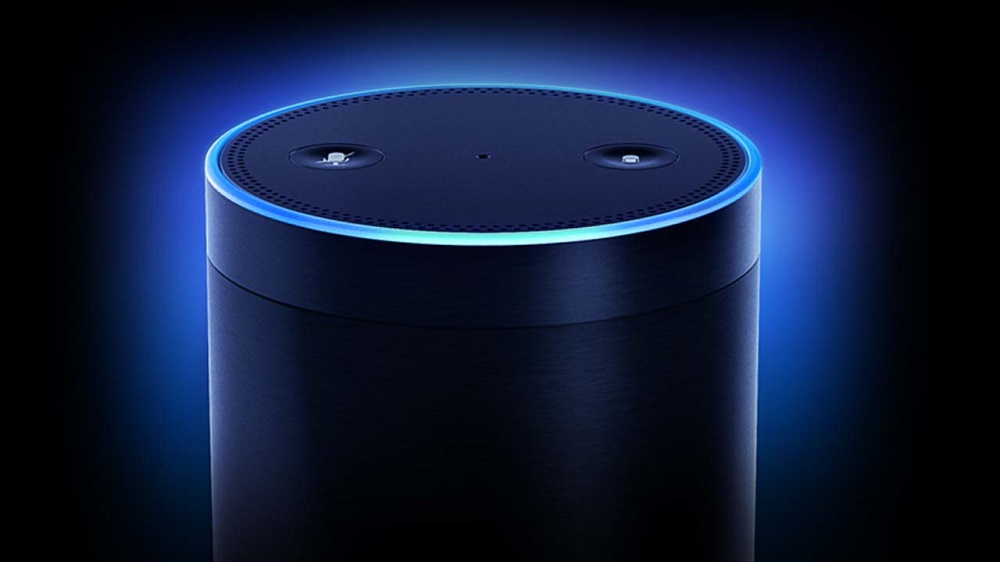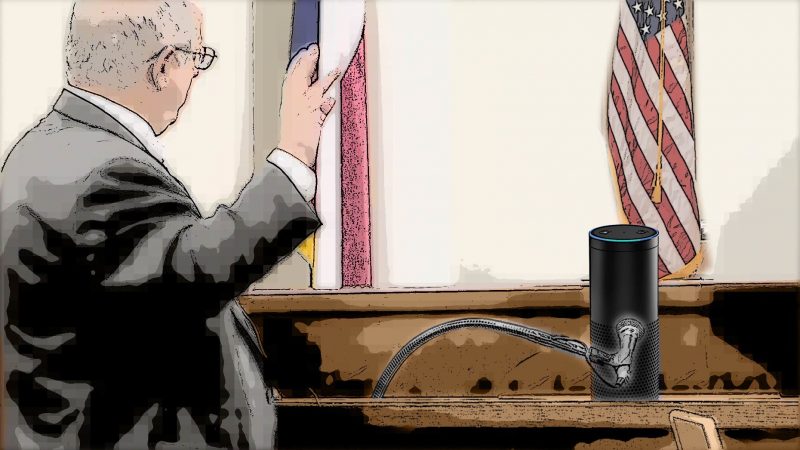
When Amazon first premiered their Echo, people were amazed at how it could do so many things and make your life easier, but they didn’t think any further than that. Then when authorities recently requested to investigate all the data on a murder suspect’s Amazon Echo smart speaker, people began wondering just exactly what is the innocuous tech piece doing in the background.
Now they’re looking at their Echo and Echo Dots a little suspiciously which leads to the big question:
Can Amazon’s Echo speaker really be a witness to a murder?
Authorities investigating the death of an Arkansas man found floating face-up in a hot tub believe that Amazon might have some evidence, given how Echo listens for commands and questions and communicates with Amazon’s servers to respond.
Details are scant. Here’s what’s known:
HOW ECHO WORKS
Echo is designed to be the hub of the smart home. The software that powers it, Alexa, is constantly listening for commands such as a request to turn on the lights or play music, or questions such as what the weather’s like. Though it’s possible to do many of these tasks using a smartphone app, issuing a voice command keeps your hands free.
IS IT SNOOPING?
No, according to Amazon. Although Alexa is always listening, Amazon says Alexa ignores what’s said until you trigger it with the “wake word” Alexa (you can change the wake word to Amazon or Echo). Only then does the Echo pass on the command or question to Amazon’s servers for processing. A blue light on the Echo comes on to let you know that’s happening.
You could argue that because Alexa is always listening, that’s snooping. But it would be the same as talking to a tape recorder. What you say is private unless you give that tape recorder to someone else. If you’re paranoid, the Echo has a mute button to disable the microphones entirely. Or just unplug it.
WHAT AMAZON KNOWS
Commands and questions preceded by the wake word do go to Amazon. Those voice snippets and transcripts, along with Alexa’s responses, are stored on Amazon’s servers. You can delete any or all such recordings through Amazon’s Alexa app, though you lose some of the personalization that comes from Alexa knowing your past requests.
WHAT DOES THIS HAVE TO DO WITH THE ARKANSAS CASE?
Police believe Victor Collins was strangled and drowned in the home of a friend, James Andrew Bates, who has been charged with murder. An Echo was found in the kitchen.
It’s not known what Amazon has on its servers. It’s unlikely that anyone asked Alexa directly on how to commit murder, but the device might have picked up background chatter or noise when fielding a routine request to play a song.
It’s also possible that the Echo itself has stored snippets of conversations prior to identifying a wake word. The snippet might have been stored temporarily as the device analyzes whether it’s a wake word. Any such snippet likely would have been overwritten already, though, as Alexa continues to listen for the wake word.
Benton County Prosecuting Attorney Nathan Smith has said that he has no idea if the device recorded anything related to the death, but authorities want to check everything as part of their investigation.
IS ALEXA ALONE?
All voice assistants – including Google‘s Assistant, Apple‘s Siri and Microsoft‘s Cortana – communicate with company servers to process requests.
They differ in what they do from there, though. Apple, for instance, insists that any communications are tied to a random identifier, not your Apple ID or anything personally identifiable. Google, on the other hand, ties everything to your account – the company says it can offer a better, more personalized experience that way.
In that sense, Google’s new Home speaker is much like Echo. Google says nothing gets passed onto its servers until Home hears the keyword “OK Google.” As with Amazon, Google offers a way to delete history data but otherwise keeps everything by default.
Alexa Murder Witness? Prosecutors Want To Look At That Data
Authorities investigating the death of an Arkansas man whose body was found in a hot tub want to expand the probe to include a new kind of evidence: any comments overheard by the suspect’s Amazon Echo smart speaker.
Amazon said it objects to “overbroad” requests as a matter of practice, but prosecutors insist their idea is rooted in a legal precedent that’s “as old as Methuselah.”
The issue has emerged in the slaying of Victor Collins, who was found floating face-up last year in the hot tub at a friend’s home in Bentonville, about 150 miles northwest of Little Rock. The friend, James Andrew Bates, was later charged with murder.
Prosecutors have asked the court to force Amazon to provide data from the Echo that could reveal more clues about the night of Nov. 22, 2015, when Collins was apparently strangled and drowned.
Benton County Prosecuting Attorney Nathan Smith said Wednesday that he has no idea if the device recorded anything related to the death. But looking for clues is simply “a question of law enforcement doing their due diligence.”
Like any investigation, “law enforcement has an obligation to try to obtain evidence of the crime,” Smith said.
The device is a cylinder-shaped speaker with internet-connected microphones that debuted in late 2014. Similar to other gadgets, it listens for a user’s voice and responds to commands – to play music, read the morning headlines or add an upcoming event to a calendar, for instance. The Echo can speak back to the user in a female voice known as “Alexa.”
The search warrant, signed by a judge in August, requests all “audio recordings, transcribed records, text records and other data” from Bates’ Echo speaker.
So far, authorities have obtained only basic subscriber and account information. Smith said Wednesday that his office has had discussions with Amazon, but that the bulk of the request remains unfulfilled.
The prosecution’s request was first reported this week by The Information, a news site that covers the technology industry.
Amazon spokeswoman Kinley Pearsall declined to comment specifically on the Arkansas case but said in a statement that the company “will not release customer information without a valid and binding legal demand.” Amazon, Pearsall added, objects to “overbroad or otherwise inappropriate demands as a matter of course.”
On its website, the company says the Echo streams audio to cloud-based storage after it detects the user’s “wake word,” and that it stops recording once a question or request has been processed.
Smith compared his request to routine warrants that seek a record of cellphone “pings,” which can be used to track a user’s location.
“It is a search warrant for a new device, but the legal concept is old as Methuselah,” he said.
The Arkansas slaying could be a test case for how evidence rules apply to information from home appliances connected to the internet such as water meters, thermostats and lighting systems, said Nuala O’Connor, president of the Center for Democracy & Technology, a nonprofit group that works on privacy and civil-liberties issues. She previously worked for Amazon.
Law enforcement agencies will have to be careful in drawing conclusions from smart systems, she said. If a case is built on changes in patterns of people’s behavior, there’s a chance that prosecutors and police “could guess wrong.”
“That’s where we’re going to get into issues of circumstantial evidence,” O’Connor said.
The next court hearing for Bates, who has professed his innocence, is set for March 17.


